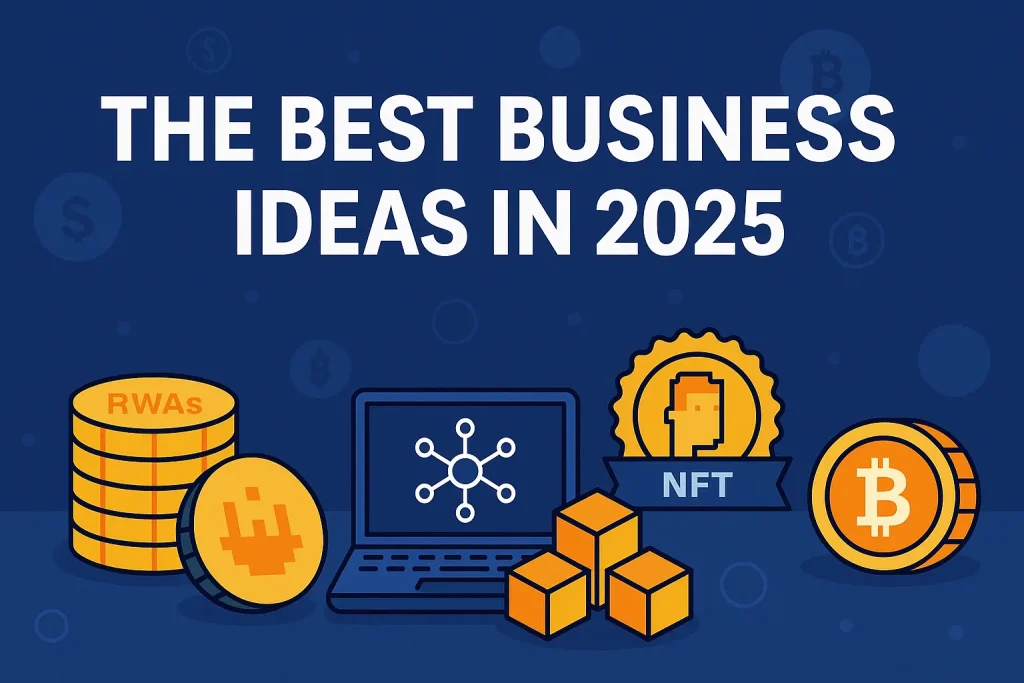Best Business Ideas 2025: Web3, Crypto & DeFi Startups
Top Business Ideas for 2025: Web3, Cryptocurrency, and the Next Wave of Innovation
2025 isn’t a year for starting some random startup — it’s for starting the right one, in the right location, at exactly the right moment. And that location is Web3. From asset tokenization to AI-powered DAOs, the most promising business opportunities this year are being started on blockchain, not spreadsheets. If you’re intent on creating a startup with competitive advantage, scalability, and sustainable growth, you need to stay close to the latest trends where crypto meets entrepreneurship.
Table of Contents
1. Tokenized Real-World Assets (RWAs)
It was only possible earlier for institutions or accredited investors to invest in real estate, art, or private debt. That’s not so anymore. Such as Ondo Finance and Securitize, indicating that tokenization of real-world assets is no hype — but rapidly turning out to be an extremely profitable Web3 business model. Tokenization offers fractional ownership, increased liquidity, and global access. Founding a startup in 2025 that plugs into the RWA movement, especially in previously untapped market spaces like high-end goods or small-scale agri, can give you the upper hand as a competitor.
2. Specialized DeFi Protocols
The broader DeFi ecosystem is overpopulated, so specialization is in vogue. The most exciting projects in 2025 are super-niche for specific markets: freight factoring DeFi protocols, say, or yield strategies for stablecoins collateralized by AI compute credits. The entrepreneurs who know the off-chain sectors and get to apply that knowledge in conjunction with DeFi primitives are poised to reign. While regulation remains complex, creative structuring through offshore vehicles or modular layers of compliance—especially those involving zk-KYC and privacy-preserving wallets—make this more accessible than ever before.
3. Freelance DAOs & Work Marketplaces
Traditional freelance platforms like Upwork and Fiverr are effective but are centralized and profit-driven. DAOs, however, are constructing a new labor economy where contributors own equity, participate in governance, and receive payment in cryptocurrencies. Imagine DAOs where auditors, designers, or writers form guilds, set bounties, and share profits. Projects like Coordinape, Clarity Protocol, and UBI DAOs are already laying the foundation. If you’re targeting the creator or gig economy in 2025, building a DAO-based platform is likely your best move.
4. NFT Loyalty Infrastructure for Brands
Loyalty programs have remained largely unchanged for two decades — until NFTs arrived. Now, NFTs can serve as access passes, reputation tokens, or time-limited deals. Starbucks already experiments, but there’s massive potential for mid-market brands, especially in eCommerce. Offering white-label, no-code NFT loyalty infrastructure is one of the most promising B2B crypto opportunities today. Adding analytics dashboards and tiered staking mechanisms can yield dynamic, gamified, and monetizable loyalty systems for businesses.
5. Wallet-as-a-Service (WaaS)
One of the main hurdles in Web3 onboarding is user wallets. Many new users drop off after installing MetaMask. WaaS providers like Magic, Privy, and Web3Auth now enable apps to onboard users via email, session keys, or social recovery, all without sacrificing custody. Building infrastructure for others—such as white-label wallets tailored for gaming, DeFi, or eCommerce—is a high-leverage opportunity in 2025. Add compliance layers and fiat gateways, and you’re creating significant B2B value.
6. Observations & Expert Notes
7. Frequently Asked Questions
Which are the most profitable Web3 business ideas in 2025?
Tokenized RWAs, niche DeFi protocols, and Wallet-as-a-Service platforms are among the top earners, especially when combined with B2B revenue streams and regulatory-compliant configurations.
How does a non-technical person start a crypto business?
Begin by validating your idea and working with a technical co-founder, or utilize no-code tools like thirdweb, Moralis, or Tatum. You can also utilize white-label infrastructure such as wallets, NFT platforms, or DAO tools.
What makes a crypto business idea shine in 2025?
Its utility and relevance. Projects that solve actual-world pain points with clean tokenomics and viable revenue streams, along with decent community engagement, governance, and localization, will succeed.
Can still start a DAO?
Yes. DAOs work best when focused on specific goals—like talent networks, research groups, or micro-funding groups. Modern compliance and onboarding tech enables it and makes it safer than ever.
How are NFTs monetized outside of art?
Through loyalty programs, digital identity, ticketing for events, or assets in games. Brands want long-term utility and inter-operability to fuel engagement, not collectibles.
8. Final Take
Every year, there are numerous business concepts that emerge, but most perish quickly. The best ones in 2025 will be rooted in physical utility, powered by crypto, and designed for a world that is connected, digitally born. If you are embarking on creating something to launch, start by asking: What problem can Web3 solve better than Web2? The answer to that question will cause you to build not only a company, but something of the next generation.




